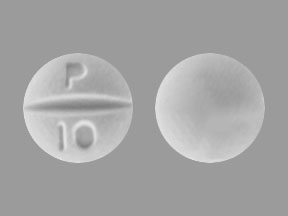Pindolol
Generic name: pindolol [ PIN-doe-lol ]
Brand name: Visken
Dosage form: oral tablet (10 mg; 5 mg)
Drug class: Non-cardioselective beta blockers
What is pindolol?
Pindolol is a beta-blocker that affects the heart and circulation (blood flow through arteries and veins).
Pindolol is used to treat hypertension (high blood pressure).
Pindolol may also be used for purposes not listed in this medication guide.
Pindolol side effects
Get emergency medical help if you have signs of an allergic reaction: hives; difficult breathing; swelling of your face, lips, tongue, or throat.
Pindolol may cause serious side effects. Call your doctor at once if you have:
-
shortness of breath (even with mild exertion), swelling, rapid weight gain;
-
slow or uneven heartbeats;
-
a light-headed feeling, like you might pass out; or
-
unusual changes in mood or behavior.
Common side effects of pindolol may include:
-
dizziness;
-
muscle or joint pain;
-
sleep problems (insomnia); or
-
feeling tired.
This is not a complete list of side effects and others may occur. Call your doctor for medical advice about side effects. You may report side effects to FDA at 1-800-FDA-1088.
Related/similar drugs
Warnings
You should not use pindolol if you have asthma, or if you have a serious heart condition such as "AV block" (2nd or 3rd degree), uncontrolled heart failure, slow heartbeats that have caused you to faint, or if your heart cannot pump blood properly.
Before taking this medicine
You should not use pindolol if you are allergic to it, or if you have:
-
asthma;
-
"AV block" (2nd or 3rd degree);
-
uncontrolled heart failure;
-
slow heartbeats that have caused you to faint; or
-
if your heart cannot pump blood properly.
To make sure pindolol is safe for you, tell your doctor if you have ever had:
-
angina (chest pain), congestive heart failure, coronary artery disease;
-
a thyroid disorder;
-
depression; or
-
liver or kidney disease.
It is not known whether pindolol will harm an unborn baby. Tell your doctor if you are pregnant or plan to become pregnant.
Pindolol can pass into breast milk and may harm a nursing baby. You should not breast-feed while using this medicine.
Pindolol is not approved for use by anyone younger than 18 years old.
How should I take pindolol?
Follow all directions on your prescription label. Your doctor may occasionally change your dose. Do not use this medicine in larger or smaller amounts or for longer than recommended.
Your blood pressure will need to be checked often.
Keep using this medicine as directed, even if you feel well. High blood pressure often has no symptoms. You may need to use blood pressure medicine for the rest of your life.
If you need surgery, tell the surgeon ahead of time that you are using pindolol. You may need to stop using the medicine for a short time.
Do not stop using pindolol suddenly, or you could have unpleasant withdrawal symptoms (tremors, sweating, headache, rapid heartbeats). Ask your doctor how to safely stop using this medicine.
Store pindolol at room temperature away from moisture, heat, and light. Keep the bottle tightly closed when not in use.
Pindolol dosing information
Usual Adult Dose for Hypertension:
Initial dose: 5 mg orally 2 times a day
Titration: The dose may be adjusted in increments of 10 mg per day every 3 to 4 weeks
Maximum dose: 60 mg per day
Comments:
-This drug may be taken with or without food.
-This drug may be given alone or in combination with other antihypertensive drugs.
-Antihypertensive response usually occurs within the first week of treatment.
-Maximal response may take 2 weeks or longer.
Use: For the management of hypertension as a single agent or concomitantly with other antihypertensive agents, particularly with a thiazide-type diuretic
What happens if I miss a dose?
Take the missed dose as soon as you remember. Skip the missed dose if it is almost time for your next scheduled dose. Do not take extra medicine to make up the missed dose.
What happens if I overdose?
Seek emergency medical attention or call the Poison Help line at 1-800-222-1222.
Overdose symptoms may include slow heartbeats, shortness of breath, or severe dizziness.
What should I avoid while taking pindolol?
pindolol may impair your thinking or reactions. Be careful if you drive or do anything that requires you to be alert.
Avoid getting up too fast from a sitting or lying position, or you may feel dizzy. Get up slowly and steady yourself to prevent a fall.
What other drugs will affect pindolol?
Tell your doctor about all your current medicines and any you start or stop using, especially:
This list is not complete. Other drugs may interact with pindolol, including prescription and over-the-counter medicines, vitamins, and herbal products. Not all possible interactions are listed in this medication guide.
More about pindolol
- Check interactions
- Compare alternatives
- Pricing & coupons
- Reviews (3)
- Drug images
- Side effects
- Dosage information
- During pregnancy
- Drug class: non-cardioselective beta blockers
- Breastfeeding
- En español
Patient resources
Other brands
Professional resources
Related treatment guides
Further information
Remember, keep this and all other medicines out of the reach of children, never share your medicines with others, and use this medication only for the indication prescribed.
Always consult your healthcare provider to ensure the information displayed on this page applies to your personal circumstances.
Copyright 1996-2025 Cerner Multum, Inc. Version: 11.01.

